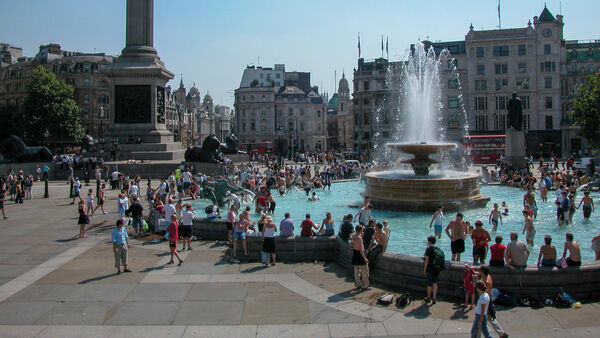Europe’s Hot…But So Is the Rest of the Planet



By Rick Steves • November 2004
The world's warming up and Europeans are feeling the heat. While Americans are mixing their science with politics, for Europeans, experiencing is believing.
The Dutch just can't skate on their canals like they used to and the Swiss remember summer skiing in the Alps as something their parents did. Throughout the Continent, restaurateurs cash in as the season for al fresco dining lasts longer than ever. During the 2003 heatwaves, high temperatures stopped trains in England. (As they weren't constructed with gaps between the rails to accommodate the expansion that occurs with scorching temperatures — standard design in hotter countries — they were buckling dangerously and closed down.) And there are more serious effects. Glaciers are vanishing, 2002 floods in Central Europe were costly disasters, and the heat wave of 2003 killed thousands. In 2004, for the first time in my life, I moved out of an Italian hotel…because it didn't have air conditioning.
While Slovenian peasants, Dutch fishermen, and American backpackers all experience these changes in Europe, scientists recognize more disturbing global changes. They know you can't directly attribute a particular climate event to global warming. But the overall rise in the frequency and severity of extreme weather is a clear and convincing symptom of global warming.
Warmer oceans produce more and stronger hurricanes — wrecking the insured mansions and yachts of Florida's wealthy and the ramshackle homes of Haiti's poor. Global warming turns gentle rains into torrents. Rather than nourish the top soil, violent rain washes it away, turning fertile farm country into wasteland. Rising Arctic temperatures — up 6 degrees since 1950 — are melting the ice cap. As this happens, the sea level rises. Rising salt water will poison aquifers, threatening drinking water.
Many in the industrialized world act like they will only be inconvenienced. “We'll stock up on bottled water and stay cool.” We already invest more energy per capita cooling people in Arizona than Norway does heating people north of the Arctic Circle.
Global warming knows no borders. Montana's majestic Glacier National Park will soon need a new name. When founded in 1910, it had 150 glaciers. Today it has less than 50 and US Geological Survey experts expect the park's last glacier to trickle away in 30 years. Things are happening fast. Environmental changes, which generally come in geological time, should not be noticeable in a human lifespan…but they are.
Global warming is a fact. CNN reports that since 1997 we've experienced the five hottest years on record (hottest: 1998, second hottest: 2002, third: 2003, fourth: 2001, fifth: 1997).
Scientists agree that: 1) the greenhouse effect is warming up the planet; 2) human emissions of carbon dioxide contribute to this greenhouse effect; and 3) global warming has already changed the earth in potentially dangerous ways. For scientists the remaining unknowns are how bad it might get…and how fast it might happen.
So far, the world's best attempt to slow global warming is an international treaty called the Kyoto Protocol. Drawn up in 1997, this pact aims to combat climate change by reducing worldwide carbon-dioxide emissions by 2010 (to 8 percent below 1990 levels). Europe has championed the Kyoto Protocol. So far, 126 countries (including all 25 members of the European Union) have ratified the pact. But even though virtually all of the world's developed countries are on board, Kyoto can only go into effect when nations accounting for 55 percent of the industrialized world's emissions have signed up. And until now, two of the biggest polluters, the US (the planet's worst, emitting about a quarter of the world's carbon dioxide with less than 5 percent of the world's population) and Russia had not signed on, so the treaty was stalled.
But now, the logjam has broken. Last month, Russia signaled that it will ratify the Kyoto Protocol. When it does, the treaty can go into effect. While the US remains the lone major holdout, American corporations doing business overseas will be required to play by its rules. For instance, as Boeing will be selling airplanes to countries abiding by Kyoto standards, it will be competitive only if it produces low emission planes.
The Bush administration had long held that it's not clear that global warming is actually happening. More recently, they acknowledge the phenomenon but propose to do very little about it. They question how directly industrial pollution contributes to the problem. And our government claims it's not fair for the US to take on such a huge cost to solve the problem, when the Kyoto Protocol demands less of poor countries like India and China.
Global climate change is like a huge ocean liner — once in motion, it can be stopped but not suddenly and not without a lot of effort. We've already created the climate in which our grandchildren will swelter. What we can do is prevent catastrophe for their grandchildren.
The rest of the world sees global warming as a manmade problem with manmade solutions. Finding solutions will help build stronger, more sustainable economies. America needs advocates eloquent enough to communicate the nature of this problem and an electorate enlightened enough to listen. And we need political leadership bold enough to use real science rather than big business interests to shape environmental policy. America should be leading this battle.
As Africa is overcome by desert, as Florida is whipped by more hurricanes, and as island nations disappear, I fear the world's rich will simply pack on the sunscreen and find hotels with better air-conditioning.
Regardless of what our country decides to do about this, I'll be taking good photos of sights and experiences my grandchildren may not have the opportunity to enjoy. Many quintessential European experiences are destined to become just memories, like old photos of romantic mountaineers frolicking on glacier-filled Swiss valleys.
I walk those valleys today — they are rocky and desolate, with a distant tongue of ice halfway up the mountain in rapid retreat. Summer skiing in the Alps? That was back in the 20th century. Dutch boys skating? You'll see them on paintings in the Rijksmuseum. And, if you always wanted to see the Maldive Islands, you better hurry.
According to Climate Solutions, the pattern is clear, and the solutions are well known: We need to build a prosperous clean energy economy to replace our outmoded dependence on costly and damaging fossil fuels. We need to use smart energy systems and efficient vehicles that waste less and reduce fuel costs. We need to develop clean, domestic energy from crops and wind and sun to reduce our crippling dependence on coal, gas, and imported oil. You can be a part of the solution by visiting and supporting Climate Solutions, a non-profit group fighting this important battle. Denis Hayes, Chairman of Earth Day, says “Climate Solutions just might be the finest regional climate group in the world.”

